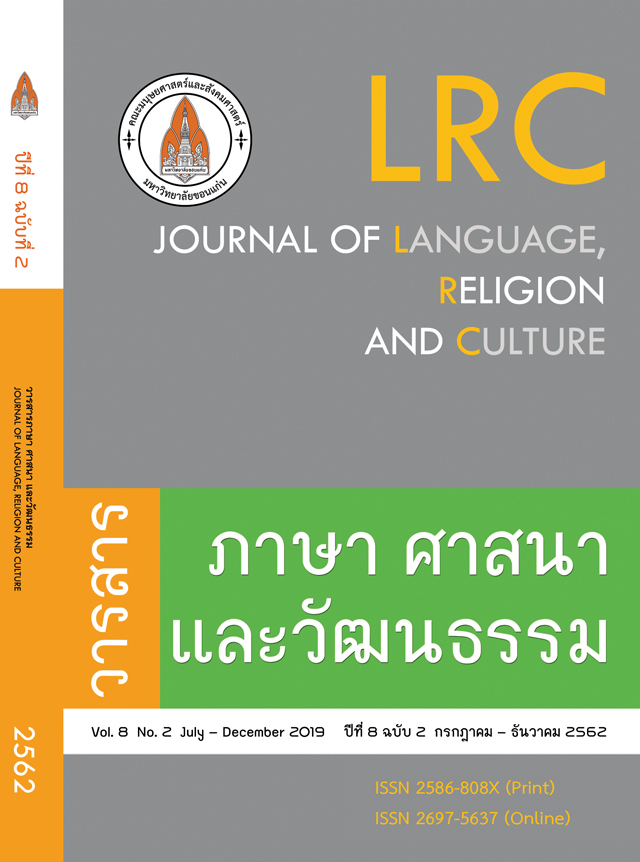ปรัชญาของขงจื่อกับการจัดระเบียบทางสังคม: การศึกษาวิเคราะห์คัมภีร์หลุนอี่ว์ ; Philosophy of Confucius and Social Organization: The Study of the Confucian Analects
คำสำคัญ:
ปรัชญาของขงจื่อ, การจัดระเบียบทางสังคม, คัมภีร์หลุนอี่ว์, สังคมศาสตร์, philosophy of Confucius, social organization, analects of Confucius, sociologyบทคัดย่อ
บทคัดย่อ
บทความวิจัยชิ้นนี้มีวัตถุประสงค์เพื่อศึกษาแนวคิดการจัดระเบียบทางสังคมของขงจื่อที่ปรากฎในคัมภีร์หลุนอี่ว์ โดยใช้แหล่งข้อมูลปฐมภูมิ คือ คัมภีร์หลุนอี่ว์ฉบับถอดความภาษาจีนปัจจุบันของหยางป๋อจวิ้น ผู้วิจัยได้นำคัมภีร์มาศึกษา แปลเป็นภาษาไทย พร้อมทั้งจัดประเภทตัวบทตามกรอบทฤษฎีโครงสร้างหน้าที่ของทัลคอตต์ พาร์สัน แล้วจึงทำการวิเคราะห์ข้อมูลด้วยวิธีวิเคราะห์ความเชื่อมโยงของเนื้อหา (content analysis) ผลการศึกษาพบว่า ขงจื่อเสนอแนวคิดการจัดระเบียบทางสังคมโดยเริ่มจากการปฏิรูปสังคมตั้งแต่ฐานรากโดยการกำหนดแบบแผนทางพฤติกรรมของสมาชิกของสังคมในอุดมคติ คือ วิญญูชนขึ้น แล้วเสนอให้ใช้การศึกษา คือ การเรียนรู้อบรมตามจารีตหรือหลี่ รวมไปถึงการรู้จักเลือกปฏิบัติตามแบบอย่างที่ดี เป็นกระบวนการในการขัดเกลาทางสังคมทั้งทางตรงและทางอ้อมเพื่อให้สมาชิกเกิดการควบคุมจากภายนอกสู่ภายใน จนบรรทัดฐานทางสังคม คุณธรรมและคุณค่าเข้าไปเป็นส่วนหนึ่งในโครงสร้างทางบุคลิกภาพของตน ขงจื่อมองว่า ผู้ที่ผ่านการขัดเกลาทางสังคมตามหลี่มาดีแล้วคือสมาชิกผู้มีคุณภาพที่สามารถปฏิบัติตามบรรทัดฐานทางสังคมได้อย่างเหมาะสมตามสถานภาพ บทบาทและช่วงชั้นทางสังคมที่ตนดำรงอยู่ โดยมีบรรทัดฐานเชิงภววิทยาคือ “มนุษยธรรม” หรือ “เหริน” (仁) เป็นเป้าหมายเชิงคุณค่าสูงสุด คือ การเดินไปสู่ความปรองดองและการมีสัมพันธภาพที่ดีงามระหว่างสมาชิกจนเกิดเป็นสังคมในอุดมคติที่เรียกว่า “ชุมชนมีมนุษยธรรม”
เอกสารอ้างอิง
จันทร์เพ็ญ อมรเลิศวิทย์. (2543). การจัดองค์กรทางสังคม. กรุงเทพฯ: สำนักพิมพ์มหาวิทยาลัยรามคำแหง.
ดลวัฒน์ บัวประดิษฐ์. (2557). จริยศาสตร์สำนักขงจื่อ: ระหว่างอัตตาณัติ กับ ความเป็นตัวเองที่เที่ยงแท้. วารสารศิลปศาสตร์ 14(2): 85-101.
ปกรณ์ ลิมปนุสรณ์. (2556). แนวทางแห่งสันติวิธีในปรัชญามั่วจื่อ: ความรัก ความเท่าเทียม ผลประโยชน์ และครรลองธรรม. วารสารจีนศึกษา 6(6) : 25-52.
ปานทิพย์ ศุภนคร. (2554).ปรัชญาจีน. กรุงเทพฯ: สำนักพิมพ์มหาวิทยาลัยรามคำแหง.
ประเสริฐ แย้มกลิ่นฟุ้ง และคณะ. (2544). สังคมและวัฒนธรรม. กรุงเทพฯ: สำนักพิมพ์จุฬาลงกรณ์มหาวิทยาลัย.
วรรณทนา ลมพัทธยา. (2556). วิญญูชนกับพลังแห่งจินตนาการ: บทวิเคราะห์การสร้างชุมชนมีมนุษยธรรมในหลุนอี่ว์.
วารสารมนุษยศาสตร์ 20: 276-311
สุพิศวง ธรรมพันทา. (2543). มนุษย์กับสังคม. กรุงเทพฯ: ภูมิไทย
สยุมพร ฉันทสิทธิพร. (2560). ปัญญาชนจีนยุคโบราณกับการรับราชการ. วารสารจีนศึกษา 10 (1): 31-55.
สยุมพร ฉันทสิทธิพร. (2561). หลักความสัมพันธ์ห้าประการและหลักบรรทัดฐานสาม มุมมองของหลักจริยธรรมกับการ
รักษาเสถียรภาพของสังคมจีน. วารสาร มจร. สังคมศาสตร์ปริทรรศน์ 7(2): 247-261
สุวรรณา สถาอานันท์. (2539). กระแสธารปรัชญาจีน: ข้อโต้แย้งเรื่องธรรมชาติ อำนาจและจารีต. กรุงเทพฯ: สำนักพิมพ์
จุฬาลงกรณ์มหาวิทยาลัย
ศรีรัฐ โกวงศ์ และคณะ. (2552). มนุษย์กับสังคม. กรุงเทพฯ: สำนักพิมพ์มหาวิทยาลัยเกษตรศาสตร์.
ศิริรัตน์ แอดสกุล. (2543). การจัดระเบียบทางสังคม. วารสารทางวิชาการ วิทยาลัยภาคกลาง จังหวัดนครสวรรค์ 2: 13-23.
เอกพลณัฐ ณัฐพัทธนันท์. (2553). ระบบเครือญาติในลัทธิขงจื่อกับปัญหาคอรัปชั่น: การตีความผ่านคัมภีร์หลุนอี่ว์. วารสาร
สังคมศาสตร์ 41 (1): 158-196.
ภาษาอังกฤษ
Brindley, Erica .(2011). Moral autonomy and individual sources of authority in the analects. Journal of
Chinese Philosophy 38 (2):257-273.
Fung, Yiu-Ming .(2014). Ren 仁 as a Heavy Concept In the Analects. Journal of Chinese Philosophy 41
(1-2):91-113.
Hwang, Kwang-Kuo (2001). The deep structure of confucianism: A social psychological approach. Asian
Philosophy 11 (3):179 – 204.
Hwang, Kwang-Kuo. (2012). Foundation of Chinese Psychology. New York: Springer.
Lai, Karyn .(2006). Li in the "Analects": Training in Moral Comptence and the Question of Flexibility.
Philosophy East and West 56 (1):69 - 83.
Li, Chenyang .(2007). Li as Cultural Grammar: On the Relation between Li and Ren in Confucius' Analects.
Philosophy East and West 57 (3):311 - 329.
Olberding, Amy .(2016). Etiquette: A Confucian Contribution to Moral Philosophy. Ethics 126 (2):422-446.
Ritzer, George. (1992). Sociological Theory. New York: McGraw-Hill.
Tae-Seung, Lim .(2015). Signs of the Sacred: The Confucian Body and Symbolic Power. Philosophy East
and West 65 (4):1030-1051.
Yao, Xinzhong .(2012). Introduction: Conceptualizing virtues in the analects of confucius. Journal of
Chinese Philosophy 39 (1):3-7.
ภาษาจีน
曹威. (2015). 论美国汉学界对《论语》中“仁”的哲学诠释. 《学术交流》, 6, 17-21.
昌盛. (2015). 从《论语》的君子观看原始儒家的情怀. 《宁夏社会科学》, 3, 186-189.
黄光国. (2001). 儒家关系主义的理论建构及其方法论基础. 《教育与社会研究》, 2, 1-34.
金尚理. (2005). 儒家伦理对中国传统组织的影响. 《甘肃社会科学》, 3, 175-177.
黄燕女. (2009). 孔子人生哲学及其对生命教育的启示. 《国民教育研究学报》, 23, 189-204.
李高等. (2012). 从社会学的视角看《论语》. 《民族论坛》, 12, 95-96.
林远泽. (2010). 克己复礼为仁—论儒家实践理性类型学的后习俗责任理论学重构. 《清华学报》,
3, 401-442.
林远泽. (2012). 礼治与正名---论儒家对于政治正当性之伦常奠基的道德文法学构想. 《汉学研究》,
3, 401-442.
刘平华. (1991). 《论语》社会学思想发微. 《湖北大学学报》, 6, 116-121.
吕红平. (2015). 《先秦儒家家庭伦理及其当代价值》. 北京:人民出版社.
吴树勤、赵凤娟. (2014). 先秦儒家论礼仪化生活普及的机制. 《西南民族大学学报 》, 4, 71-74.
周树华、张登国. (2007). 先秦儒家社会思想与和谐社会的建构.《 兰州学刊》, 5, 16-18.
杨伯峻. (2007). 《论语译注》. 北京:中华书局.







